Markets and strategy
Tecan is a pioneer and market leader in laboratory automation and a healthcare enabler. The company is improving people’s lives and health by empowering customers to scale healthcare innovation globally. Tecan enables customers to scale their innovation, whether in laboratory workflows for life science research, various applied markets and diagnostics or in product development and manufacturing for the medical market. Tecan delivers this broad range of healthcare products and services, directly to end users or with OEM partners.
For laboratories, Tecan’s solutions automate all types of repetitive work steps and make procedures more precise, more efficient and safer. These steps include many pre-analytical steps and sample logistics, as well as the various sample preparation steps in numerous application areas.
They pipette the smallest volumes of different fluids with optimum precision, for example. By automating these work steps, laboratories can significantly scale up the volume of samples they process, obtain test results sooner and ensure reproducible output. It is only through automation that complex biological work processes become robust and human error sources are eliminated. The instruments can also perform necessary work overnight without supervision, allowing laboratory personnel to evaluate the results or continue with the next steps upon returning the following morning.
Through the Partnering Business, automation solutions can be fully integrated solutions that cover all necessary steps to the result, i.e. sample in, result out. Partners bring these solutions to market under their own brand names together with the respective reagent kits.
Tecan also offers a wide range of own detection devices. This includes analytical devices such as microplate readers, which analyze reactions on a microtiter plate. For selected applications, Tecan also increasingly offers integrated total solutions, including appropriate reagents and functional consumables.
The company also develops and produces a whole range of OEM solutions for the detection step, which includes a number of very different instruments.
After the acquisition of Paramit, Tecan is able to provide an even more comprehensive value proposition for customers in the healthcare industry. Paramit has developed and/or manufactured several FDA-approved medical devices, including critical modules and systems for surgical robotics, point-of-care and personal testing devices. Paramit also works with life science companies developing and manufacturing high-precision instrumentation, including a range of products for genomics, proteomics and cell-analysis.
UNIQUE POSITION WITH TWO STRONG PILLARS
The Company serves some customers directly, but is also a leader in developing and manufacturing OEM instruments, components and modules that are distributed by partner companies. These are for example diagnostics companies that market the products under their own names as total solutions together with the relevant test kits. With the acquisition of Paramit Tecan has expanded its OEM business also in the area of medical devices.
These two segments, the Life Sciences Business (end-customer business) and Partnering Business (OEM business) complement each other and achieve a position that is unique in such depth on the market. Tecan can offer the complete spectrum for different customer groups, from benchtop devices for basic research to sample-to-result solutions for in-vitro diagnostics companies to modules and systems for surgical robotics and personal testing devices for medical technology companies. This puts Tecan in a unique position to combine insights from basic research with the requirements for solutions for routine clinical use.
The life science research area is highly innovative and is where most new technologies are developed and initially employed as a matter of routine. Traditionally Tecan has a strong position in life science research thanks to its own end-customer business, covering a broad range of applications with modular and configurable instrument platforms.
Many of these technologies here also have great potential for diagnostic application. In the last few years, for example, next-generation sequencing has proved to be of great benefit, such as in identifying inheritable diseases, in cancer diagnostics or in non-invasive prenatal diagnostics.
New types of tests are normally carried out after an initial transition to diagnostic application, at first in large or special laboratories. As demand rises and the processing of many samples is centralized in a small number of locations, automation solutions are mostly required to scale up throughput. As in life science research, most individual work steps of a workflow are separately optimized and carried out in succession. As lab developed tests, the test procedures are internally developed and validated by the laboratories in this regulated market segment. The application is scaled and industrialized. Tecan has already gained significant experience in new types of technologies and can now make this available to clinical testing laboratories. Through its life sciences business, Tecan often has application-specific platforms that are approved for use in the regulated area. For example, the Fluent Gx platform variant has been successfully registered as a Class I medical device in the US. Its specific functionalities facilitate greater process security, traceability of samples and stricter user management.
For further transition to routine clinical application, as a technology becomes increasingly mature, demand from decentralized clinical laboratories for the new types of test procedures also rises, such as in hospitals. These laboratories typically have other requirements for a total solution: The tests should be developed by a diagnostics company as ready-made reagent kits and the licensing authorities should have granted market authorization. Furthermore, the dedicated automation platform designed for a specific functionality should be very easy to use and all work steps necessary for carrying out the test are ideally covered in one instrument (sample in, result out).
For companies in the in-vitro diagnostics sector, Tecan is a preferred partner for these automation systems through the Partnering Business. For example, Fluent Gx can be adapted for a partner company’s specific test and workflow. A diagnostics company can benefit from Tecan’s expertise and platform availability, leading to cost-efficient development and quicker market entry. Based on this strategic orientation, collaboration with different partners enables Tecan in turn to benefit from the growth potential in a range of different types of technologies and tests for numerous therapeutic areas and other special parameters.
Despite different requirements, the fundamental technologies are very similar for the automation of work steps compared to previous solutions. By choosing to partner with Tecan as OEM customers, diagnostics companies get access to all the Company’s previously developed technologies and platforms, all modules and software solutions as well as its expertise in system integration and regulatory and quality-related processes.
At the moment, different technologies are in a transition phase towards increased deployment in in-vitro diagnostics, such as next-generation sequencing (NGS), mass spectrometry or the use of liquid biopsies, such as for cancer diagnostics.
MARKET DEVELOPMENT AND STRUCTURE AS THE BASIS FOR CORPORATE STRATEGY
Traditionally, Tecan’s two main markets were life science research and diagnostics. The acquisition of Paramit further extends Tecan’s position in solutions for life sciences and in-vitro diagnostics (IVD). It also adds a new business vertical in the attractive and fast-growing market for medical devices. The structure of these end markets plus the focus on the core applications of genomics, protein analysis and cell analysis form the basis of the corporate strategy. It follows three vectors to ensure sustainable profitable growth. The Paramit acquisition added a vector 4 and 5.
Research and development as well as the Operations division are organized across the Group in order to better leverage synergies through various locations.
Life Science Research
The addressable market for Tecan in life science research is valued at USD 4-5 billion and is growing at an annual rate of 3% to 5%. Some two-thirds of sales come from instruments and about a third from reagents.
Laboratory automation, a field in which Tecan is active in mainly with the Life Sciences Business, is an important market segment within life science research. Slightly over half of the Life Science Business segment revenues are generated in life sciences research. Looking at the product groups, the Liquid Handling & Robotics category generates over USD 1.6 billion of the total revenue in this market segment with the initial systems.
It also represents the largest product area for instruments at Tecan. Through the Partnering Business, Tecan also supplies other vendors in this market with off-the-shelf or custom components and platforms for life science instruments.
The market for Tecan-branded detection instruments, another sub-segment of lab automation, accounts for about USD 0.6 billion.
In addition, Tecan participates in the aftermarket of the laboratory automation segment with consumables, service and spare parts. The market for consumables like pipette tips and other related products accounts for over USD 1 billion in addition to the initial systems. The service share is worth another USD 1.3 billion.
Tecan has also expanded its offering of dedicated reagents. For example, the company provides innovative genomic sample preparation for NGS and microarrays for a broad range of sample types including RNA and DNA from whole tissues, preserved and prepared tissue samples, single cells and liquid biopsies such as from blood samples.
Tecan is also aiming to build up further pillars in the instrument market for life science research. For its Life Sciences Business, this applies in particular to areas beyond conventional, open and flexible robotics solutions for liquid handling and microplate readers. There are plenty of opportunities here, especially in dedicated instruments for sample preparation, e.g. the sample processing for mass spectrometry. This growth pillar also includes the newly introduced innovative entry level solutions for next-generation sequencing (NGS) library preparation, MagicPrep NGS. MagicPrep NGS is an automated benchtop library preparation system that transforms time-consuming and error-prone procedures into a simple, robust experience with a setup time of only 10 minutes.
Paramit now adds capabilities which allow Tecan to further strengthen its customer offering for the life sciences research through the Partnering Business – illustrated by vector 4. With its engineering as well as cost-competitive manufacturing capabilities, Paramit opens up new opportunities for a whole variety of benchtop size life science research instruments. These could be systems for genome mapping and sequencing, molecular antibody characterization, multiplex biomarker detection, single cell imaging, multiplex gene expression analysis and many more areas. In total, about 20% of the Partnering Business segment revenues are generated in life science research.
In-vitro Diagnostics
The total addressable market for Tecan in in-vitro diagnostics is valued at around USD 4 billion and is comparable to the life science research market in terms of the average annual growth rate.
The market structure in general is dominated by the share of sales generated by diagnostics companies through the sale of reagents and consumables. These recurring sales make up about 80% of the market volume, while the remaining 20% of sales are generated with instruments.
The instruments in the in-vitro diagnostics market are only partly developed and produced by the diagnostics companies themselves, with an increasing share being outsourced to specialists such as Tecan. In this sub-sector of the market segment, which has a value of about USD 3.5 billion, Tecan supplies diagnostics companies with automation solutions through its Partnering Business segment. Customers then market these instruments under their own names, combined with their own reagents as a total solution, such as hospitals, major diagnostics laboratories and blood banks. Diagnostics is the largest end market for the Partnering Business, accounting for a bit below 50% of segment sales.
In its Life Sciences Business segment, Tecan sells open automation platforms, mainly to major diagnostics and genetic testing laboratories. Overall, slightly less than half of sales in the Life Sciences Business are generated in regulated markets such as clinical diagnostics.
For example, the Fluent Gx platform variant was developed for the automation of laboratory workflows in regulated markets. Here Fluent can be used for applications such as high throughput nucleic acid purification, quantification and normalization or as a scalable solution for PCR amplification. In the US, it is registered as a Class I medical device.
Tecan also offers detection devices that are used for absorbance-, fluorescence- and luminescence-based clinical immuno-assays.
Paramit expands the total addressable market for diagnostic instruments with capabilities around smaller near-patient or point-of-care testing devices. These are for example systems for performance capillary electrophoresis (HPCE), flow-through hybridization, molecular diagnostics and digital pathology.
Also in this market, Tecan participates in the aftermarket with reagents for specialty diagnostics, functional consumables for mass spectrometry, and again consumables like pipette tips.
ELISA technology is such an example of a popular application, which is used to determine specialty diagnostic parameters, such as evidence of rare infectious diseases or to verify certain hormone levels. In this specialty diagnostics area, Tecan is offering a portfolio of test kits as well as dedicated automation platforms.
Medical Devices (Medical Mechatronics)
The addressable market of medical mechatronics products represents a significant opportunity of between USD 13-15 billion, thereby more than doubling Tecan’s original total addressable market. Approximately one third of sales in the Partnering Business segment are generated in the medical mechatronics end market through Paramit.
With medical devices, the addition of Paramit’s capabilities and customer portfolio adds an entirely new business and growth vertical to Tecan. The targeted medical mechatronics sub-segment is part of the broader medical device market and consists of instruments and mechanical and robotic modules that are controlled by custom electronics. The Paramit portfolio includes components, modules and systems, based on robotic, micro fluidics, optical, laser and radio frequency technologies for key applications, leveraging technical and regulatory core competencies that are very similar to Tecan’s. Products include sub-modules for robotic surgery systems, energy based devices and platforms, cardiovascular controllers, portable defibrillators, home hemodialysis systems, patient monitoring and telemedicine devices, products that range from hand-held devices to larger cart-based systems.
In research and development, the team is also very conversant with the ways energy can be delivered to human tissue, and its effects on the body, for example to reduce scar tissue or applying it in a variety of different surgical applications.
SPECIAL FOCUS ON THREE APPLICATION AREAS
Tecan covers a large number of different application areas thanks to its two segments of Life Sciences Business and Partnering Business. Special focus is placed on three applications to achieve continued growth that outstrips the market average. Particularly strong growth drivers form the basis of them:
• Genomics
• Protein analysis, particularly workflows of mass spectrometry
• Cell and tissue analysis
These three applications are generally used in life science research as well as in in-vitro diagnostics. Both business segments therefore offer growth potential for Tecan. As screenings of genomic, proteomic, cellular and tissue assays have grown in sensitivity, breadth and sophistication, so have Tecan’s underlying technology portfolio and product lines. A rationale driving researchers and clinical partners towards Tecan is its overarching integration of modular hardware and software building blocks across a variety of end applications. The company has pioneered the development and deployment of sophisticated architectures and libraries that can be configured rapidly and optimized for specific use cases.
Genomics
Genomics is the systematic analysis of the genome, e.g. a cell, tissue, organ or complete organism. A genome is the complete DNA sequence of an organism, including all its genes. Genomics is a fundamental application in life science research and is increasingly used in diagnostics.
Since 2020, polymerase chain reaction (PCR) became one of the most powerful weapons in the fight against the coronavirus pandemic. It provides a fast, specific and very sensitive way to detect invading pathogens, even when they are present in extremely low numbers.
Even before COVID-19, the whole genomics market has grown to more than USD 20 billion. Some of the subsegments are developing here at an average single-digit rate, others such as next-generation sequencing (NGS) even at a double-digit rate.
NGS workflows are composed of multiple complex steps, most of which need to be performed prior to loading samples in the actual sequencer. The crucial step prior to sequencing is library preparation, which is a particularly attractive market segment and a focus of Tecan’s area of work. There are also growing needs in handling small volume samples and preparing libraries, especially when derived from challenging clinical samples. But even with other work steps of the various genomics workflows, starting with the basic step of DNA extraction, Tecan is well positioned.
Also, genomic needs in precision and personalized medicine, companion diagnostics, fast and sensitive multiplexed assays are a big growth driver. Increasingly, NGS for example is used for liquid biopsies to detect minimal residual disease in patients, monitor cancer recurrence, or their response to a specific treatment, simply by checking for tumor DNA (cfDNA) in the patients’ blood.
Protein Analysis
All proteins in an organism, tissue or cell are called proteomes. Unlike with the genome, the composition of a proteome changes all the time. These changes are crucially affected by the environment and diseases, but also by drugs, for example. In order to research and analyze proteins, a range of techniques is available, notably mass spectrometry. The innovations that yield insights into the human proteome are still at an earlier stage but they are following in the footsteps of genomics.
The market for all areas of mass spectrometry is worth around USD 5 billion. The sub-segment of sample preparation, which is particularly attractive for Tecan, has grown at an average rate in the high single-digit range to some USD 0.7 billion. The key growth driver here is the increasing number of biopharmaceuticals, a class of compounds produced using biotechnology resources and genetically modified organisms. Analyses based on mass spectrometry are also increasingly applied in in-vitro diagnostics in addition to their traditional use in life science research. For example, Tecan is enabling to prepare MALDI slides with high precision and sensitivity in an innovative approach to diagnose multiple myeloma at an earlier point in the disease.
The focus of Tecan’s work area is mainly on sample preparation for mass spectrometry. The ability to extract insights from mass spectrometry rests on the ability to purify samples, separating them from background noise. Tecan is also well positioned for other analysis methods, such as immunoassays or other common work steps, such as protein purification.
In more and more cases it is becoming increasingly important to combine genomic test information with other profiling assays, such as protein expression in integrated solutions.
Cell and tissue analysis
Cells are independent biological functional units and the starting point for many studies. Biological processes can be understood and clarified at cellular level thanks to cell analysis. Researchers offer trials a more realistic model with cells or groups of cells for transferring findings on organisms. For example, cell assays are increasingly used to develop new drugs.
The size of the overall cell analysis market, i.e. the various areas of cell biology and imaging, is estimated to be around USD 10 billion. Here market growth is in the mid-single digit percent range.
In cell analysis, Tecan offers innovative detection and imaging solutions, but also a broad portfolio of automation solutions for different work steps. Cell lines and primary cells are widely used for the production of cell-derived biomolecules, as well as for cell-based assays. For example, Tecan provides sophisticated, modular automation solutions from 2D and 3D cell cultures with cloning, transfection and colony picking to the point of cell-based assays and cellular analysis.
Through its Partnering Business, Tecan also supplies leading diagnostics companies in the areas of tissue analysis for cancer diagnostics, flow cytometry and other applications.
TECAN BENEFITTING FROM VARIOUS MEGATRENDS
Megatrends are long-term transformation processes that depict far-reaching social and technological changes. The markets in which Tecan is active are positively influenced by a number of megatrends. They also result in increased sample volume and a significant rise in diagnostic tests as well as surgical procedures and other medical interventions that are carried out. This requires higher levels of productivity. The tests and procedures must be reproducible and accurate, the processes standardized and robust. Strict regulatory standards must also be complied with. Tecan has systematically focused its corporate strategy on these markets and requirements and can therefore obtain significant benefits from these transformation processes.
The 21st century has often been described as a century of biological discovery and development – the century of biology. It is estimated that, every six months, the world’s laboratories generate more biological data than has ever been created in human history. The ensuing discoveries and their applications will change human life forever.
For example, with the COVID-19 pandemic, the scientific community reacted fast.
Researchers were able to decode its RNA sequence and identify the structures and made them available globally. Labs were able to develop rapid diagnostic tests and – crucially – pharmaceutical and biotechnology companies were able to develop vaccines within 10 months.
Also in other areas, for example in oncology, new anticancer drugs have been approved in the last few years with entirely novel mechanisms of action for treatment, such as the first products based on gene therapy approaches.
Megatrends | Positive effects on Tecan |
Population growth and the aging population | Many diseases, such as cancer and cardiovascular diseases, are more prevalent in old age. Around the world, significant sums are being invested in the development of innovative drugs, medical devices and surgical procedures to improve treatments. Numerous novel drugs were approved in recent years, many of which are based on previously unused modes of action. The total volume of diagnostic tests that enable diseases to be identified is increasing and more tests are being carried out per person.
As many diseases are being treated with increasing success, people live longer, which increases the demand for automated solutions for diagnostic testing and medical devices, e.g. for patient monitoring. |
| High levels of investment in healthcare for better prevention, diagnosis and treatments, also in emerging markets | Overall, there is a significant investment in health care, with a focus on prevention and treatment monitoring in addition to immediate or acute diagnostics. Growing levels of prosperity also mean that the demand in the area of healthcare is rising continuously. China, for instance, is now one of the world’s largest healthcare markets, although its spending per capita is still significantly below that of many western industrialized countries. |
| Development of targeted pharmaceuticals and innovative surgical procedures | The growing use of personalized medicine means that the biomolecular constitutions of individual patients are increasingly taken into account, allowing targeted drugs to be deployed. Tecan supports research into characteristic biological features (biomarkers) and the development of new active ingredients with automation solutions. Tecan solutions are also being used in companion diagnostics.
|
| An explosion of knowledge in the field of biological correlations and molecular processes – using these findings in applied markets | Life science research is coming up with new findings at an ever quicker pace. These are being increasingly used not only in drug development and human diagnostics, but also in numerous applied markets.
|
Digitalization of processes and increased regulatory complexity | The growing demand for automation is supported by an increasing digitalization of the laboratory environment, where Tecan is again a key innovator in digital solutions, both in terms of user interface and laboratory connectivity. The ever increasing regulatory complexity in clinical and medical markets requires more assistance with quality systems management or process validation, regulatory advice or enterprise risk management – an area Tecan is recognized as a global leader in quality and regulatory affairs. |
Genetic testing for large parts | Another trend that Tecan is benefiting from is the fast-growing and increasingly popular market for genetic testing. This development was made possible by the rapidly declining costs of gene sequencing and other technologies. In various research programs, some of which are state-funded, the DNA of several million people is to be analyzed to increase the diagnosis rate of rare and sometimes inheritable diseases. Analysts assume that in future, most people in developed nations will undergo gene sequencing at least once in their life. At the same time, another market segment has emerged, mainly in the US, where millions of consumers on the internet apply for genetic testing, for example, tests for inheritable diseases or for genealogical research. Various work steps are being automated in large laboratories using Tecan instruments. |
Megatrends and their positive effects on Tecan
Population growth and the aging population
Many diseases, such as cancer and cardiovascular diseases, are more prevalent in old age. Around the world, significant sums are being invested in the development of innovative drugs, medical devices and surgical procedures to improve treatments. Numerous novel drugs were approved in recent years, many of which are based on previously unused modes of action. The total volume of diagnostic tests that enable diseases to be identified is increasing and more tests are being carried out per person.
Increased demand for innovative medical devices: these same underlying trends also increase the demand for medical devices such as cardiovascular controllers, home hemodialysis systems, patient monitoring and telemedicine devices or for surgical robots that make surgeries more effective and less invasive.
Shortage of skilled labor: at the same time, the baby boomer generation that is retiring cannot be replaced, leading to a shortage of skilled workers and thus increasing the demand for automation.
As many diseases are being treated with increasing success, people live longer, which increases the demand for automated solutions for diagnostic testing and medical devices, e.g. for patient monitoring.
High levels of investment in healthcare for better prevention, diagnosis and treatments, also in emerging markets
Overall, there is a significant investment in health care, with a focus on prevention and treatment monitoring in addition to immediate or acute diagnostics. Growing levels of prosperity also mean that the demand in the area of healthcare is rising continuously. China, for instance, is now one of the world’s largest healthcare markets, although its spending per capita is still significantly below that of many western industrialized countries.
Development of targeted pharmaceuticals and innovative surgical procedures
The growing use of personalized medicine means that the biomolecular constitutions of individual patients are increasingly taken into account, allowing targeted drugs to be deployed. Tecan supports research into characteristic biological features (biomarkers) and the development of new active ingredients with automation solutions. Tecan solutions are also being used in companion diagnostics.
Through its newly acquired Paramit business, Tecan also participates in market segments like robotic surgery and cardiovascular controllers.
An explosion of knowledge in the field of biological correlations and molecular processes – using these findings in applied markets
Life science research is coming up with new findings at an ever quicker pace. These are being increasingly used not only in drug development and human diagnostics, but also in numerous applied markets.
Some examples: In forensics, criminals are being convicted based on DNA profiling. The same techniques and procedures used in human diagnostics are being employed in diagnostics for farm animals. In the food industry, special products are being developed that counteract disorders of the intestinal flora. In these laboratories too, state-of-the-art automation solutions from Tecan improve efficiency.
Digitalization of processes and increased regulatory complexity
The growing demand for automation is supported by an increasing digitalization of the laboratory environment, where Tecan is again a key innovator in digital solutions, both in terms of user interface and laboratory connectivity. The ever increasing regulatory complexity in clinical and medical markets requires more assistance with quality systems management or process validation, regulatory advice or enterprise risk management – an area Tecan is recognized as a global leader in quality and regulatory affairs.
Genetic testing for large parts of the population and directly to consumers
Another trend that Tecan is benefiting from is the fast-growing and increasingly popular market for genetic testing. This development was made possible by the rapidly declining costs of gene sequencing and other technologies. In various research programs, some of which are state-funded, the DNA of several million people is to be analyzed to increase the diagnosis rate of rare and sometimes inheritable diseases. Analysts assume that in future, most people in developed nations will undergo gene sequencing at least once in their life. At the same time, another market segment has emerged, mainly in the US, where millions of consumers on the internet apply for genetic testing, for example, tests for inheritable diseases or for genealogical research. Various work steps are being automated in large laboratories using Tecan instruments
CORE COMPETENCES AND COMMONALITIES
Tecan’s success is based on core competencies that the Company has systematically acquired and expanded over the years. Tecan’s core competence was built around the automation of complex processes in life science research laboratories and in the strictly regulated diagnostics market. This overall competence is made possible by core competencies in system integration as well as in individual aspects of an application’s typical processes. In robotics, Tecan is the market leader in the automation of very diverse repetitive work steps that have to be conducted in laboratories. Its core competencies cover both instruments and the software packages needed for their operation as well as cloud-based software solutions that enable the connectivity of instruments. Tecan offers a wide-ranging portfolio of different modules to automate applications and work processes, such as examining DNA or cells.
Tecan expanded its capabilities and competences through the acquisition of Paramit.
Paramit is an expert at manufacturing complex electromechanical systems for the medical and life sciences industries. The company combines custom microfluidics, electronics, optics and motion control to help its clients create a range of products, from handheld or point-of-care devices to benchtop instruments and cart-based systems.
The acquisition also brings significant engineering as well as cost-competitive manufacturing capabilities, both in North America and in the APAC region.
Paramit’s patented, computer-directed assembly technology, vPoke®, resolves complex mechanical assembly into tightly controlled assembly steps for medical device and life science instruments. The process generates a rich device history record, providing component traceability, while reducing the potential for errors (“zero-defect manufacturing”).
There are many commonalities for the various key applications and product use cases of the combined Tecan/Paramit portfolio that cover a variety of healthcare uses, such as cancer, infectious diseases, metabolic diseases and many more. The product and service offering allows scalability of processes and workflows as well as the scaling of the manufacturing itself, it increases reproducibility and standardization of processes and procedures, delivers precision and robustness. As the majority of customers are working in a regulated environment like diagnostics or medical devices, regulatory compliance is a must in these areas.
Tecan has particular technical expertise in liquid handling and detection. Liquid handling involves the high-precision handling of fluids, even in the smallest quantities. This process includes the aspiration and dispensing of liquids with differing physical and chemical properties, such as reagents and blood (both whole blood and serum). The quantities of fluid involved can typically range from milliliters to microliters. Some applications require the handling of even smaller quantities, for which Tecan can also provide technologies. Tecan also has the necessary sensor technology to monitor processes, for example, to ascertain whether a liquid transfer has actually taken place. One of the Company’s particular competencies is the ability to make these often highly complex processes easy to perform through user-friendly software with an intuitive user interface.
To enable the entire workflow to be automated, Tecan also integrates third-party devices. Customers benefit from the enormous application know-how of Tecan specialists, even in strictly regulated areas such as clinical diagnostics.
In the area of detection, Tecan specializes in analytical devices that use a variety of optical methods to detect reactions in a test procedure, such as the binding of an antibody to a target molecule. This can take place, for example, with fluorescence, luminescence, absorption methods or through imaging technologies. Tecan also uses patented technologies here to lower the detection limit or reduce diffused light and thereby increase the sensitivity. Tecan detection instruments are able to process varying wavelengths quickly and flexibly, even in parallel.
Beyond technical expertise, Tecan has significant application know-how in the various disciplines of life science research and clinical diagnostics. One of the Company’s unique selling points and core competences is its ability to bridge the gap between research and the strictly regulated diagnostics market for its customers and partner firms. The steady increase in regulatory requirements presents a major challenge, in particular for smaller companies and companies that are traditionally oriented only toward the research market. Tecan can benefit from these growing market barriers, as it has built up these core competences and invested in regulatory compliance for years.
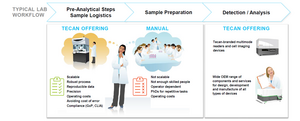
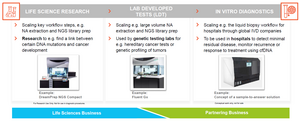
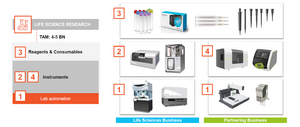
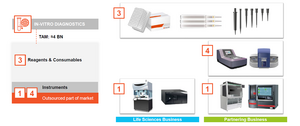
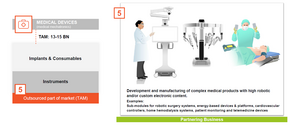
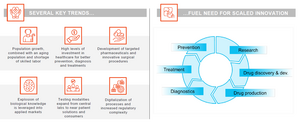
Follow Tecan